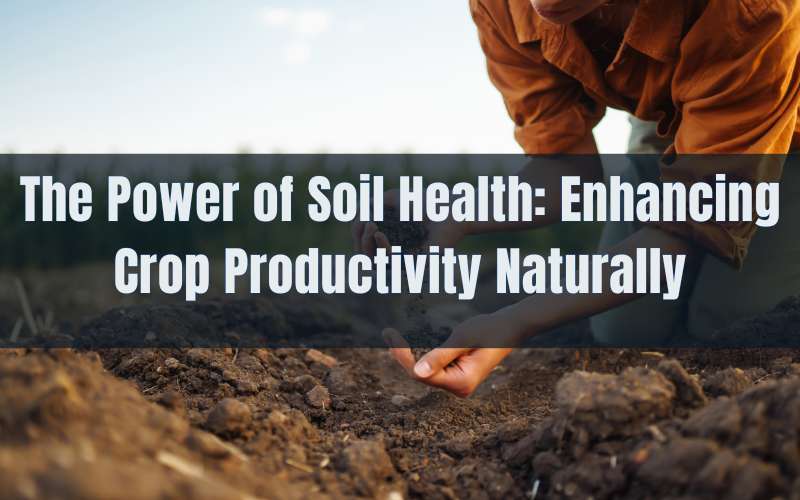Soil health is the foundation of agriculture, playing a crucial role in determining crop productivity and sustainability. In this article, we delve into the significance of soil wellness and explore natural methods for enhancing it to boost crop yields.
Understanding Soil Health
Soil health refers to the overall condition of the soil, encompassing its physical, chemical, and biological properties. A healthy soil provides a favorable environment for plant growth, nutrient uptake, and water retention.
The Link Between Soil Health and Crop Productivity
The health of the soil directly impacts crop productivity. Soil with adequate nutrients, good structure, and a thriving microbial community supports robust plant growth and higher yields. Farmers who prioritize soil productivity often witness improved crop resilience to pests, diseases, and adverse weather conditions.
Natural Methods for Enhancing Soil Health
Crop Rotation and Diversity
Crop rotation involves alternating the types of crops grown in a particular field over successive seasons. This practice helps prevent soil depletion of specific nutrients, reduces pest and disease pressure, and improves soil structure.
Cover Crops and Green Manure
Cover crops, such as legumes and grasses, are grown primarily to cover the soil rather than for harvest. They help prevent erosion, suppress weeds, and add organic matter to the soil when incorporated. Green manure crops, like clover and vetch, are grown specifically to be incorporated into the soil, enriching it with nitrogen and other nutrients.
Reduced Tillage and No-Till Farming
Tillage, or plowing, can disrupt soil structure and deplete organic matter. Reduced tillage and no-till farming practices minimize soil disturbance, preserving soil structure and organic matter. These methods improve water infiltration, reduce erosion, and enhance soil microbial activity.
Composting: A Key Component
Composting involves the decomposition of organic materials, such as crop residues and kitchen scraps, into nutrient-rich compost. Adding compost to the soil improves its structure, fertility, and biological activity, leading to healthier plants and increased yields.
Managing Soil Fertility
Maintaining soil fertility is essential for sustaining crop productivity. Organic fertilizers, derived from natural sources like compost, manure, and bone meal, nourish the soil while promoting microbial activity. In contrast, synthetic fertilizers provide readily available nutrients but may harm soil life and long-term soil health if overused.
The Role of Microorganisms
Microorganisms, including bacteria, fungi, and protozoa, play vital roles in soil health. Beneficial microbes help decompose organic matter, fix nitrogen, and suppress plant diseases. Practices like adding organic matter and minimizing chemical inputs support a diverse and active soil microbiome.
Balancing Soil pH
Soil pH, a measure of its acidity or alkalinity, influences nutrient availability and microbial activity. Most crops prefer a slightly acidic to neutral pH range. Agricultural lime or organic amendments can be used to raise soil pH, while elemental sulfur or acidifying fertilizers can lower it, ensuring optimal conditions for plant growth.
Soil Conservation Techniques
Soil erosion and degradation pose significant threats to soil health and agricultural sustainability. Implementing erosion control measures, such as contour plowing, terracing, and buffer strips, helps prevent soil loss and preserves its productive capacity for future generations.
Challenges in Maintaining Soil Health
Despite the importance of soil health, numerous challenges persist, including soil degradation, erosion, and pollution. Intensive agricultural practices, improper land management, and chemical inputs contribute to these issues, highlighting the need for sustainable farming practices and environmental stewardship.
Government Initiatives and Support
Governments worldwide are recognizing the importance of soil quality and implementing policies to promote sustainable land management practices. Initiatives aimed at soil conservation, organic farming, and research funding provide support and resources to farmers striving to enhance soil health and productivity.
Case Studies: Success Stories
Numerous farmers and agricultural organizations have successfully implemented soil health practices with remarkable results. By adopting conservation agriculture techniques, improving soil fertility, and restoring degraded lands, these pioneers demonstrate the potential for sustainable agriculture and increased resilience to climate change.
Educating Farmers and Communities
Spreading awareness about the importance of soil health is crucial for fostering widespread adoption of sustainable farming practices. Educational programs, farmer training workshops, and community outreach initiatives play a vital role in empowering individuals and communities to prioritize soil conservation and regeneration.
Future Outlook
Advancements in soil health research, technology, and agricultural practices offer promising solutions for addressing current challenges and enhancing crop productivity sustainably. By leveraging innovative techniques, embracing regenerative agriculture principles, and fostering collaboration between stakeholders, we can build a resilient and productive agricultural system for future generations.
Conclusion
The power of soil quality in enhancing crop productivity naturally cannot be overstated. By implementing sustainable soil management practices, farmers can improve soil fertility, resilience, and productivity while mitigating environmental risks. Let us prioritize soil quality and work together to cultivate a sustainable food future for all.
Unique FAQs
1. Why is soil health important for agriculture?
– Soil quality influences crop growth, nutrient uptake, and water retention, directly impacting agricultural productivity and sustainability
.
2. What are some natural methods for enhancing soil health?
– Crop rotation, cover cropping, composting, and reduced tillage are among the natural techniques used to improve soil health and fertility.
3. How does soil pH affect crop growth?
– Soil pH influences nutrient availability and microbial activity, affecting plant growth and productivity. Maintaining the optimal pH range is essential for crop health.
4. What role do microorganisms play in soil health?
– Beneficial microorganisms contribute to soil fertility, nutrient cycling, and disease suppression, enhancing soil wellness and supporting plant growth.
5. How can farmers contribute to soil conservation?
– Farmers can implement erosion control measures, adopt conservation agriculture practices, and prioritize soil health in their farming operations to conserve and protect soil resources.
Know More About Author: Prince Khanuja And Khanuja Group




